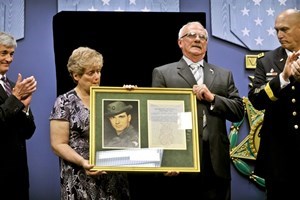
Rose Mary Sabo-Brown, Sabo's widow, and George Sabo, Sabo's
brother, receive a framed picture and letter honoring Sabo as
defense leaders posthumously induct the Vietnam-era soldier
into the Hall of Heroes at the Pentagon.
DOD photo by Glenn Fawcett
By Amaani Lyle
American Forces Press Service
WASHINGTON, May 17, 2012 – Defense Secretary Leon E. Panetta today lauded a war hero whose gallantry earned the Medal of Honor and whose life exemplified the 20th century.
Panetta spoke at the induction of Army Spc. 4 Leslie H. Sabo Jr. into the Pentagon’s Hall of Heroes.
Sabo, a rifleman with the 101st Airborne Division, was killed in eastern Cambodia during the Vietnam War. His widow, Rose Mary Sabo-Brown, accepted his posthumous award of the Medal of Honor from President Barack Obama yesterday in a White House ceremony.
"Specialist Les Sabo’s life encompassed three continents and a sweeping arc of history," Panetta said. "His story was, in many ways, the story of the 20th century."
Sabo saved the lives of several fellow soldiers in Company B, 3rd Battalion, 506th Infantry, when his platoon was ambushed near the Se San River in eastern Cambodia on May 10, 1970. Immediately preceding his death, he shielded a comrade from an enemy grenade and silenced a machine-gun bunker.
"He was a remarkable soldier who displayed the kind of courage and bravery that few in history have been able to muster," Panetta said, adding gratitude for "his legacy of service and sacrifice that still burns brightly in the millions of men and women who serve [the] nation in uniform."
Sabo’s story, the secretary said, represents the intersection of immigration and ambition that is a thread that runs through American history. Born in Austria right after World War II, Sabo was raised by parents who left Soviet-occupied Hungary to make their way to the United States.
"They joined millions of immigrants, including my own parents, who left Italy just a decade earlier, in pursuing a basic dream: the dream of giving their children a better life," Panetta said.
Sabo soon realized his "American dream" once the family settled into western Pennsylvania, surrounded by coal mines and steel mills. There, he became an avid athlete and met his wife. Sabo’s ingrained values of service and sacrifice, Panetta said, would play out when his family’s adopted country called him to serve in April 1969.
"He answered that call and put on the uniform of the United States Army," Panetta said. "In an instant, he went from average to exceptional." Sabo joined the storied 506th Infantry Regiment, the same unit that had led the way in liberating his native continent from the grip of fascism two decades earlier.
"Deploying to Vietnam, Les found himself in the thick of a tough fight," Panetta said. "And within five months, he had his encounter with destiny."
The secretary detailed Sabo’s actions during the Mother’s Day ambush that took his life and noted their importance to the soldiers he saved and their families. "Only the generations of people who will walk the Earth because of what Les did that day can fully convey the importance of his courage and bravery," he said.
Even as the Vietnam generation ages, Panetta said, the country’s recognition of their service and sacrifice will not wane. He added that he plans to visit the Vietnam Veterans Memorial during Memorial Day weekend in commemoration of the war’s 50th anniversary.
"We will always remember and carry in our hearts the more than 58,000 soldiers, sailors, airmen, Marines and Coast Guardsmen whose names are inscribed on that wall for eternity," he said.